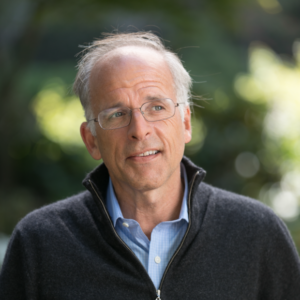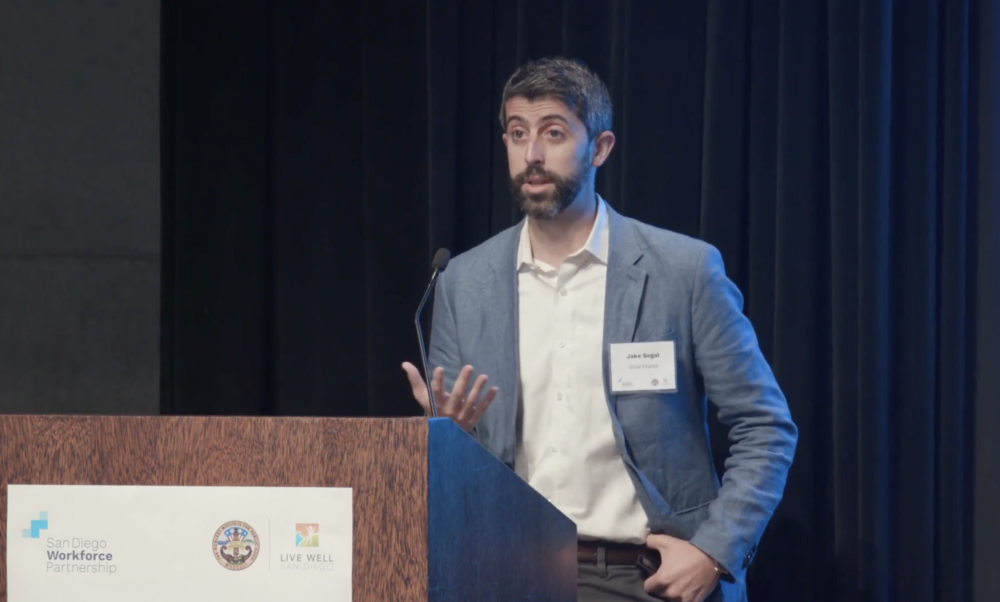

Michael Grossman joined Social Finance in September 2021 to oversee the organization’s impact investing work. In this interview, Michael shares how he got to Social Finance and his vision for the organization.
What drew you to Social Finance?
 Michael Grossman: I left my previous role at New Island Capital in September 2020, and over the course of 2021, I was trying to figure out how to continue the work I had been doing there, which was lending money to companies, nonprofits, platforms, and funds in deals where financial outcomes and environmental or social outcomes converged. We had done a lot of lending—somewhere around $350 million over seven years, which is a big number for the impact investing industry. One of my partners and I wanted to continue to do this work together.
Michael Grossman: I left my previous role at New Island Capital in September 2020, and over the course of 2021, I was trying to figure out how to continue the work I had been doing there, which was lending money to companies, nonprofits, platforms, and funds in deals where financial outcomes and environmental or social outcomes converged. We had done a lot of lending—somewhere around $350 million over seven years, which is a big number for the impact investing industry. One of my partners and I wanted to continue to do this work together.
But then I heard about this opportunity at Social Finance. I had talked to Tracy in 2013 when the firm was primarily doing Social Impact Bonds and was pretty impressed. So, we had another conversation. Her ability to articulate her vision and turn it into action, combined with my own interest in structuring deals for underserved communities—basically what I’ve done throughout my entire career—made it a good fit. It sounded like interesting, hard, and rewarding work.
You’ve been in the impact investing industry, or at least adjacent to it, for some time. How did you get started in the industry and what experiences sort of guided your career?
Grossman: I started my career working for Citibank in Africa in the Ivory Coast. There was a major currency devaluation which led to all of this capital rushing back into the country. We ended up creating financial products that had been created in other markets 100 years before but had never really made the jump to the Ivory Coast. And then after some time at Citibank Morocco, they promoted me to be the general manager of Citibank Senegal at the age of 34.
This was a dominant business within its target market and brilliant people had preceded me. It was impact investing in real life. We figured out how to finance the Hajj, the pilgrimage to Mecca, one of the most sacred rites in Islam. Hundreds of thousands of Africans go to Mecca every year for the Hajj and at the heart of this journey is a foreign exchange transaction—you have to rent an apartment in both Mecca and Medina a year in advance, in this case, converting CFA francs into Saudi Riyals. Just think about how complicated that is, especially for a population that has no interaction with the financial system.
We figured out how to do that. And I was like, “Wait, so businesses can actually make an impact like this. We’re doing something that’s really good for people.” Then we figured out how to finance an extension of the national electric grid by discounting future receivables for the big hotels around Senegal. We took a risk on Sofitel or Hilton and used that money to finance electrification.
I got promoted and went to Citibank Tunisia for three years. Eventually I wanted to go back to the U.S. but still wanted to continue working in Africa, serving those markets. There was this new thing being created called the Millenium Challenge Corporation, a foreign aid agency focused on stimulating economic growth in the world’s poorest countries. I was the managing director for Africa there. My team did economic-growth-oriented grants for four countries totaling $1.5 billion.
My last role before Social Finance was at New Island Capital, which is a single-family office. New Island’s shareholder inherited a serious amount of money relatively late in life, and she had come to two realizations. One was that she’d done nothing to deserve the money, and that it came with a lot of responsibility. And then two, that she couldn’t just give the money away. It didn’t really belong to her—she was a steward for these assets her grandparents had created. So, she created an impact investing firm, without actually knowing such a thing existed.
It was a venture capital shop with a climate focus when I joined. Over the years we realized that if people feel they have a stake, they will act sustainably. And so we really focused on enabling sustainability and aligned entrepreneurs by lending money to organizations whose business outcomes converged with climate and social outcomes.
In the end, impact investing, like all investing, is a utility. We can use it to help achieve good outcomes but it’s one thing in a universe of other tools you need to tackle big challenges.
As you think about deploying impact investing in your work at Social Finance, are there any specific opportunities that come to mind? Are there any projects that you would like to see us take on?
Grossman: I’m still very much just understanding what people are working on here. But the evolution of our toolkit, from Social Impact Bonds to Career Impact Bonds and their derivatives, is really remarkable. So I’m thinking, what’s the next extension of this outcomes-based work, and our impact-first investments? I’m super enthusiastic about the team’s capacity to figure that out.
Another thing I’m thinking about is how we can play an even greater intermediation role. There are a lot of people who need capital, particularly impact-first nonprofits that won’t generate a 12% internal rate of return. This work is not going to generate the kind of returns that a lot of private investors expect. But because of our authenticity, gained through the hard work of really focusing on outcomes for a long time, we have credibility with foundations, family offices, and high-net-worth individuals. In my experience, these partners are all looking for meaningful projects to put their money into, and get something back, but might not have the capacity to effectively analyze an investment fund, for example. We’ve shown we can play that role and more, and I’m excited to build on the work our team has done to build our brand.
The impact investing industry has developed rapidly over the past decade and now encompasses $715 billion in assets, across a variety of classes, per the Global Impact Investing Network. As you start to navigate this new role, where do you see the industry heading as it continues to mature?
Grossman: I’m a practitioner, so I see things tactically. I will observe that climate change mitigation investments have become big over the last 5-7 years because climate change is having an impact on the value of assets, right? We live in a capitalist society and asset owners are seeing the destruction of value. And I think for the first time since the 1960s, we’re seeing appreciable value erosion caused by inequality in the U.S. So, you’re starting to see an asset-led approach to addressing social issues as well.
Those of us in the financial system can play a role in intermediating toward change. Our ability to raise and blend capital, and structure deals, allows us to play a leading role in addressing climate and social challenges.
I also see a rapid evolution in the area of donor-advised funds taking place. I think Social Finance is positioned to lead here, as we’re finding new ways to unlock this huge pool of capital and deploy it in a way that drives change. And then finally, large corporations are starting to understand that their customers demand more of them, so they’re changing the way they act.
Learn more about our impact investing work →
Learn more about Michael →
Related Insight
Meet Social Finance’s New Vice President, Government Relations, Sandra Salstrom
Sandra Salstrom joined Social Finance in October 2021 to lead government engagement efforts. We spoke with Sandra about her new role and the importance of building connections with government partners.

Meet Social Finance’s Vice President, Head of Impact Advisory and Public Sector Practice Jake Segal
Jake Segal recently assumed leadership of Social Finance’s Public Sector Practice, which he helped establish after joining the organization in 2014. Jake discusses his new role and the continued evolution of the Public Sector Practice.
Meet Social Finance’s Vice President, Public Sector Partnerships, Donnie Charleston
Social Finance Vice President Donnie Charleston discusses his background in local and state government and his vision for supporting public sector institutions seeking to spark change.